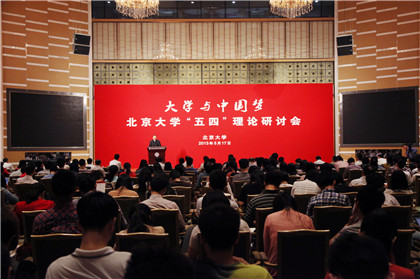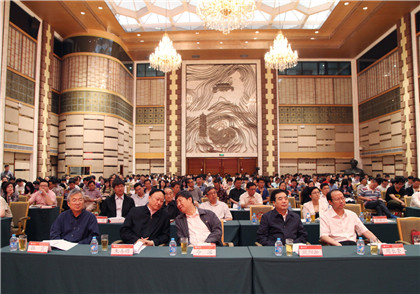Peking University, May 23, 2013: “China has made great achievements in the aspect of ‘Science’ and ‘Democracy.’ On this basis, ‘Morality’ and ‘Law’ should be put high on agenda,” said Professor Qian Chengdan with the PKU (Beida) Department of History.
Professor Qian interpreted the value of morality and law in the May Fourth Theory Seminar at PKU with the theme “University and Chinese Dream” on May 17.
“‘Science’ can only step forward in the right direction under the guidance of ‘Morality,’ and ‘Democracy’ be maximized under the protection of ‘Law.’ Therefore, only the combination of ‘Science,’ ‘Democracy,’ ‘Morality’ and ‘Law’ can guarantee a better future for China,” Professor Qian added. “Moral and legal education should first be carried out at universities, then extended to the society to promote social development.”
“The annual May Fourth Theory Seminar at Beida provides a high-level exchange platform for experts and scholars from different fields,” said PKU Council Chairman Zhu Shanlu. “The seminar has contributed much to the theory innovation for our country with the support of experts, scholars, teachers and students.”
“For over 100 years, the development of Beida has always been bound up with the fate of our nation. In this new era, the Beida dream of edging into a world-class university is also closely linked with the Chinese dream of the great rejuvenation of Chinese nation,” Zhu detailed the relationship between the Beida dream and Chinese dream.
“Beida people are now learning the spirit of the 18th CPC National Congress and the essence of the Chinese dream. We have also held several activities with the theme of ‘Beida dream and Chinese dream,’” he added.
“In order to shoulder the responsibility in realizing the Chinese dream, Beida people should put forth effort to cultivate talents who can contribute to the great revival of our nation; make consistent innovation on education theory, personnel training mode, science and technology, and humanistic and social science theory; and play an important role in building up an advanced socialist culture,” noted Chairman Zhu.
The spirit of May Fourth Movement with its core value of “patriotism, progress, democracy and science” is the spiritual wealth of the university. Thus, Zhu hoped that Beida people could carry on the spirit, shoulder the responsibility and contribute to the revival of the Chinese nation in the process of pursuing the Beida dream.


The seminar
Several experts and scholars from such institutions as the Party History Research Center of the CPC Central Committee and Beijing Foreign Studies University (BFSU) shared their own views on “what is the Chinese dream,” “How to realize the dream,” and “the relationship between universities and the dream” after Zhu’s opening address.
Ouyang Song, director of the Party History Research Center of the CPC Central Committee interpreted the core value of the Chinese dream from the perspective of the spirit of May Fourth Movement. He emphasized that the people’s well-being played a decisive part in the process of realizing the dream, for the work and innovation made by people is a must for the revival of the Chinese nation.
Academician Tian Gang, dean of the PKU School of Mathematical Sciences, shared his view on the relationship between universities and the Chinese dream. He said that only through every individual’s work could the Chinese dream be realized. “As for the work of the school, we should strengthen the construction of teaching staff, enhance research capability, cultivate young talents with innovative and pioneer spirit and strive for a world-class School of Mathematical Sciences,” he added.
Professor Wang Bo, dean of the PKU Department of Philosophy reviewed the history of PKU and other Chinese universities before expounded the evolution of university spirit. “University spirit acted an irreplaceable role in the social development, especially in a pluralistic society.” He also mentioned “compatibility” and “serenity,” saying that these two factors were crucial when pursuing the Chinese dream.
Initiated in the early 1980s, the May Fourth Theory Seminar was usually held annually around China’s Youth Day (May 4), also the anniversary day of the university. Focusing on major problems in the reality and the ideological field, especially on the problems about socialist road, theory and system with Chinese features, the seminar has become an important exchange platform for experts and scholars from theoretical and academic circles. It aims to promote the country’s development through innovative theories formulated at the seminar.
The May Fourth Movement was an anti-imperialist, cultural and political movement growing out of student demonstrations in Beijing on May 4, 1919. These demonstrations sparked national protests and marked the upsurge of Chinese nationalism, according to Wikipedia.
As an institution of higher education, a stronghold of the pursuit of freedom of thoughts, Peking University played a significant role as the initiator and the main force of this student movement. The spirit of May Fourth Movement has also infused into the culture of the university which inspires hundreds of thousands of Beida people to pursue their ideals.
Written by: Zhu Wenjia
Edited by: Jacques
Source: PKU News (Chinese)